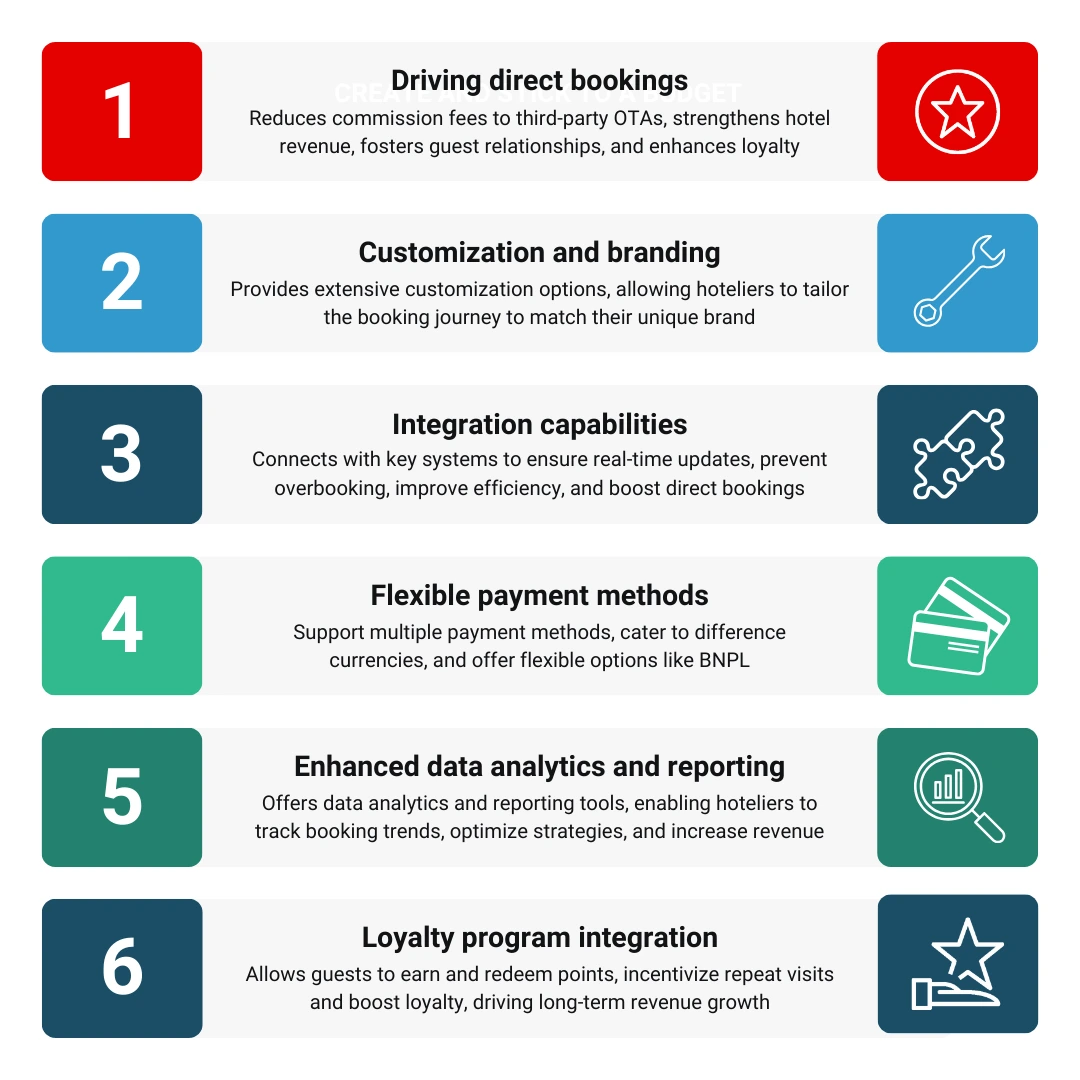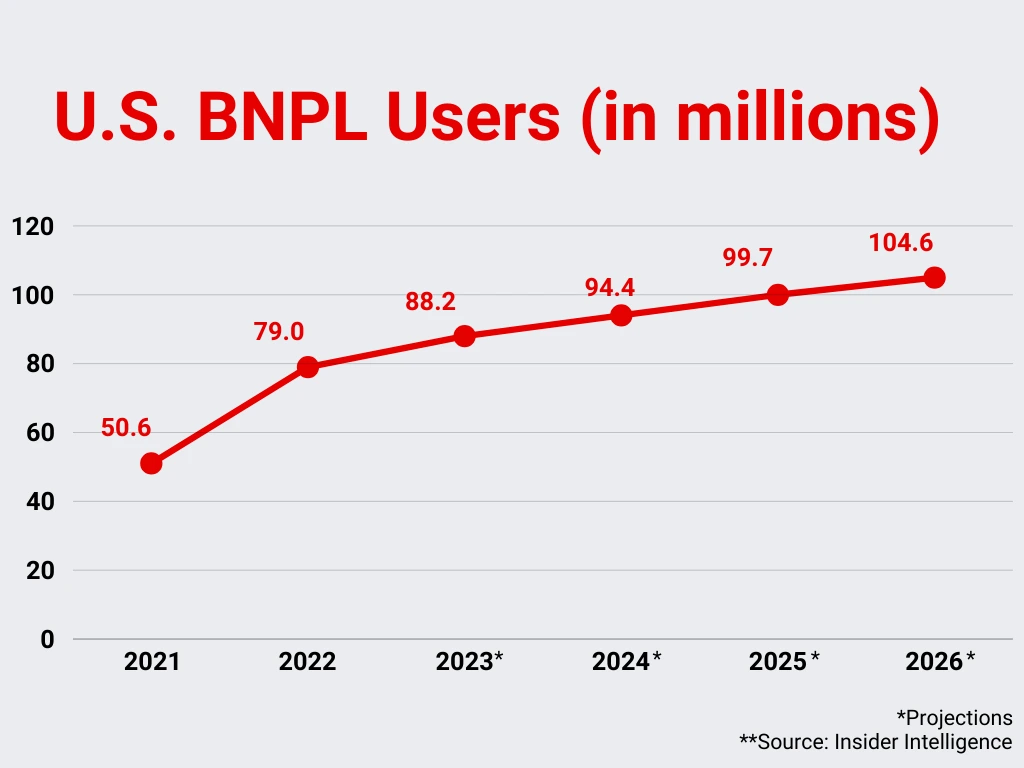In this Article:
- Increase revenue by reducing reliance on OTAs
- Incentivize repeat bookings by incorporating loyalty programs
- Hotel booking engines should integrate with PMS, CRS, and other systems
- Flexible payment methods attract a broader audience
- Maintain brand consistency by using customization features
What is a hotel booking engine?
A hotel booking engine is an essential tool for modern hotels. It enables guests to make reservations directly through a hotel’s website or mobile app. At its core, a booking engine is a software application that provides an online solution for potential guests to view available rooms, check rates, and make reservations in real-time.
In today’s digital age, businesses must connect with consumers digitally. It’s more than just a convenience—it’s a necessity. Guests now expect a seamless, user-friendly experience when booking their accommodations. By providing this, your hotel can effortlessly meet their needs and stand out as their preferred choice.
A well-designed booking engine ensures this process is smooth and intuitive, reducing the likelihood of booking abandonment. Integrating with the hotel’s property management system (PMS), a booking engine provides up-to-date availability and pricing information, ensuring accuracy and avoiding overbooking.
Beyond facilitating reservations, modern booking engines offer a range of features designed to enhance the guest experience and drive direct bookings. These features can include personalized booking experiences, loyalty program integration, and the ability to upsell additional services and amenities.
For example, the SynXis Booking Engine drives direct bookings by increasing engagement and triggering conversions and allows hoteliers to control their brand experience and deliver an excellent user experience.
A hotel booking engine is a critical component of a hotel’s digital strategy, providing the tools needed to attract, convert, and retain guests. Hotels can improve their bottom line and build lasting relationships with their guests by offering a seamless and efficient booking process.
Key benefits of a hotel booking engine

Driving direct bookings:
OTAs can take up to 30% in commission per hotel room
Implementing a top-notch booking engine is crucial for driving more direct bookings. By providing an easy, user-friendly booking experience on your hotel’s website, a booking engine encourages guests to book directly rather than through third-party online travel agencies (OTAs). This shift reduces commission fees paid to OTAs and allows hotels to build direct relationships with their guests, enhancing customer loyalty and retention. A direct booking strategy strengthens the hotel’s revenue stream and enables better control over the guest experience from the very beginning.
Customization and branding:
A high-quality booking engine offers extensive customization options, enabling hoteliers to tailor the booking journey to match their hotel’s unique brand, look, and feel. This consistency in branding helps create a distinctive and cohesive image from all points of view. The best booking engines include a designer tool that allows hotels to customize their booking pages without any coding experience.
Integration capabilities:
Automatically showing room price parity between your booking engine and OTAs can increase direct bookings by as much as 14%
A well-integrated booking engine can connect seamlessly with a hotel’s property management system (PMS), customer relationship management (CRM) software, and other key systems. This integration ensures real-time updates on room availability and pricing, preventing overbooking and enhancing operational efficiency. In addition, features like price parity tools and OTA price comparison can boost direct bookings by ensuring that guests see consistent pricing across all solutions.
Flexible payment methods:
The most effective booking engines support various payment methods, eliminating barriers that might prevent guests from completing their purchases on mobile devices or desktops. If a hotel caters to a wide selection of international travelers, its booking engine should cater to currencies in respective regions. Additionally, features like Buy Now Pay Later (BNPL) through systems like Uplift expand the potential customer base by offering flexible payment options, appealing to guests seeking more affordable solutions.

Enhanced data analytics and reporting:
A high-quality booking engine provides enhanced data analytics and reporting tools, which are crucial for making informed decisions. These tools allow hoteliers to monitor booking trends, understand guest preferences, and optimize their strategies based on data-driven insights. By analyzing this data, hotels can identify areas for improvement, identify their marketing efforts, and ultimately increase their revenue.
Loyalty program integration:
Increasing customer retention rates by just 5% can boost profits by up to 95%
Integrating a booking engine with loyalty programs is another major benefit. This feature allows guests to earn and redeem points directly through the hotel’s booking solution, incentivizing repeat visits and providing additional value with each stay. Hotels can entice more guests to join their loyalty programs by showing loyalty member pricing to non-members before login. This integration drives customer loyalty and contributes to long-term revenue growth by encouraging guests to return for future stays.
Next steps:
1. Define your needs and goals
Identify your hotel’s specific needs and goals. Understanding your priorities will help you choose a booking engine that aligns with your objectives.
2. Research and compare options
Conduct research on various booking engine options on the market and compare their features, pricing, and customer reviews. Consider solutions that provide a comprehensive set of features and may even be a one-stop-shop for other hotel systems.
3. Assess integration capabilities
The booking engine you select should seamlessly connect with your other hotel systems like CRS, CRM, etc., for real-time updates on availability and pricing, as well as operational efficiency.
4. Book demos
Make sure to get a feel for the booking engine of your choice by asking for a deep dive and demos of the software. You can request one for SynXis Booking Engine by clicking here!
By following these steps, you can select a booking engine that not only meets your current needs but also supports your hotel’s growth and success in the competitive and ever-changing hospitality industry.
Related articles:
- Sabre Hospitality Attains Booking.com Premier Status
- 5 Tips for Unlocking Hotel Excellence
- Hotel Marketing Trends and Insights
- The Concept of Attribute Based Selling (ABS) in Hospitality Technology
Written by Maura Valentine
SynXis Booking Engine
SynXis Booking Engine helps you Go Beyond the capabilities of a standard hotel booking engine, optimizing your direct booking path and converting customers.
Boost your direct bookings
Sign up to see how SynXis can transform your booking process, streamline guest experiences, and elevate your revenue




